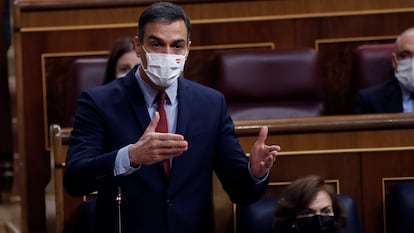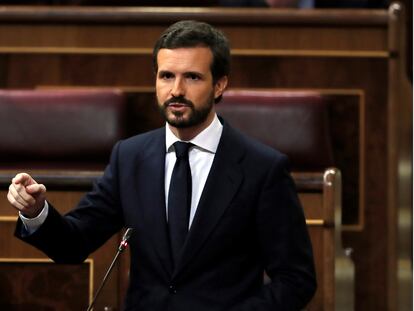Spain’s PM agrees to more congressional oversight during state of alarm
Pedro Sánchez will appear regularly before parliament in exchange for support for a six-month extension to the emergency measure

Spanish Prime Minister Pedro Sánchez has agreed to appear before Congress every two months to explain his government’s handling of the coronavirus crisis. The move follows accusations from across the political spectrum that he was overstepping his bounds by trying to secure a six-month extension to the state of alarm declared last Sunday while avoiding frequent accountability for his actions in parliament.
The emergency state was declared in a bid to introduce tougher restrictions on mobility amid a new rise in coronavirus cases that is straining the country’s healthcare system.
Faced with criticism, the leader of the Socialist Party (PSOE) on Wednesday morning proposed a review of the coronavirus situation four months from now by a committee of central and regional health officials. Sánchez said that if, by then, this group says there is no further need for a state of alarm, the government could lift it ahead of its own planned deadline of May 9.
It later emerged that Sánchez has agreed to appear before Congress every two months in exchange for a favorable vote for a six-month state of alarm from the Catalan Republican Left (ERC). This option gives the executive and the Health Ministry a little more leeway to handle the crisis than if the PM were forced to make monthly reports as some other parties want, said PSOE sources.
The government’s plan will be put to the vote on Thursday in the lower house of parliament, where Sánchez heads a minority government with the leftist Unidas Podemos. The opposition has also criticized the fact that Sánchez himself will not be there to defend the extension tomorrow and is sending Health Minister Salvador Illa in his place.
The two-month alternative

The main opposition Popular Party (PP) wants a shorter, two-month state of alarm, particularly with a view to saving the Christmas season. Other parties want more frequent congressional oversight: “Yes to the state of alarm, and also to accountability,” said Iñigo Errejón, a lawmaker for Más País and former top official of Podemos, who wants Sánchez to report to Congress once a month. The ERC’s congressional spokesman, Gabriel Rufián, had said on Tuesday that the attempt at a six-month extension with little oversight could be “democratically dangerous.”
The executive is confident that it will receive enough votes after negotiating with ERC and other parties that endorsed Sánchez’s return to the prime minister’s office in January. This would eliminate the need for the PP’s support, although last-minute changes before Thursday’s vote are not being ruled out.
Speaking during question time in Congress on Wednesday, the leader of the main opposition group, Pablo Casado of the PP, described Sánchez’s plans as abusive.
“Yesterday you approved a six-month state of alarm that goes beyond the rule of law,” said Casado, alluding to the Tuesday Cabinet meeting that approved the plan to extend the extraordinary legal measure until May 9, 2021, pending congressional approval on Thursday.
“We have offered you a state pact on healthcare, and we’ve spent the last six months proposing a legal Plan B. You’re still in time to accept our proposal for an eight-week state of alarm, which would save Christmas. Why don’t you accept it?” asked Casado.
In response, Sánchez offered the possibility of reviewing the situation in four months. “What the government is doing is fighting resolutely against the virus, governing jointly with the regions. The goal is to save lives and businesses,” he said. “This government supports unity and reaching out across the aisle. My proposal is that if, in four months, the Inter-Territorial Council [a committee of central and regional health officials] feels the state of alarm is not necessary, then the government will review its decision and lift it. First review on March 9, second review on May 9.”
Second state of alarm
Sánchez declared a state of alarm on Sunday in a bid to contain the spread of the coronavirus. The legal framework allows authorities to introduce restrictions on mobility without first seeking court authorization on a case-by-case basis. But most of the responsibility for imposing restrictions falls to regional governments, while the only nationwide measure introduced so far is a night curfew. Several regional governments have already used the new tool to temporarily close their own borders, while others are considering doing the same.
The executive can only impose a state of alarm for a period of 15 days, after which it needs congressional support for new extensions. By seeking a six-month renewal, Sánchez wants to avoid a repetition of the situation that emerged in March, when the first state of alarm was declared in Spain, and Sánchez was forced to seek extensions every 15 days at increasingly acrimonious congressional debates.
English version by Susana Urra.
Tu suscripción se está usando en otro dispositivo
¿Quieres añadir otro usuario a tu suscripción?
Si continúas leyendo en este dispositivo, no se podrá leer en el otro.
FlechaTu suscripción se está usando en otro dispositivo y solo puedes acceder a EL PAÍS desde un dispositivo a la vez.
Si quieres compartir tu cuenta, cambia tu suscripción a la modalidad Premium, así podrás añadir otro usuario. Cada uno accederá con su propia cuenta de email, lo que os permitirá personalizar vuestra experiencia en EL PAÍS.
¿Tienes una suscripción de empresa? Accede aquí para contratar más cuentas.
En el caso de no saber quién está usando tu cuenta, te recomendamos cambiar tu contraseña aquí.
Si decides continuar compartiendo tu cuenta, este mensaje se mostrará en tu dispositivo y en el de la otra persona que está usando tu cuenta de forma indefinida, afectando a tu experiencia de lectura. Puedes consultar aquí los términos y condiciones de la suscripción digital.








































